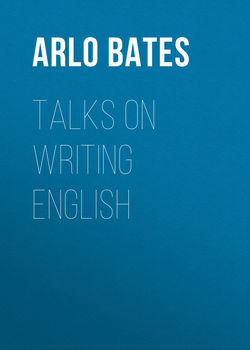Talks on Writing English

Реклама. ООО «ЛитРес», ИНН: 7719571260.
Оглавление
Bates Arlo. Talks on Writing English
PREFACE
I. THE ART OF WRITING
II. METHODS OF STUDY
III. PRINCIPLES OF STRUCTURE
IV. DETAILS OF DICTION
V. PRINCIPLES OF QUALITY
VI. PRINCIPLES OF QUALITY CONTINUED
VII. MEANS AND EFFECTS
VIII. MEANS AND EFFECTS CONTINUED
IX. CLASSIFICATION
X. EXPOSITION
XI. EXPOSITION CONTINUED
XII. ARGUMENT
XIII. ARGUMENTATIVE FORM
XIV. DESCRIPTION
XV. DESCRIPTION CONTINUED
XVI. NARRATION
XVII. NARRATION CONTINUED
XVIII. ACCESSORIES OF NARRATION
XIX. CHARACTER AND PURPOSE
XX. TRANSLATION
XXI. CRITICISM
XXII. STYLE
Отрывок из книги
Into all productive art enter two sorts of power, that which is communicable and that which is incommunicable, – in other words, that which may be taught and that which is inborn. Upon this fact is based the distinction between the mechanical and the fine arts, although since both kinds of power have a share in all production nobody has ever been able to draw a sharp and definite line at which the mechanical arts end and the fine arts begin. The power which is incommunicable is that of imagination, that indefinable grace and skill, that enchantment of creative ability which is born with rare individuals, and for which he who is not dowered with it by nature struggles in vain. It is this which has given rise to that saying as profound as it is terribly hackneyed which declares that a poet is born and not made. It is this which distinguishes genius from talent; and it is this which has so dazzled the eyes of the world as to produce the mistaken notion that since imagination is not to be learned nothing is to be learned in the realm of art.
This incommunicable power is the soul of fine art; yet into fine art no less than into the mechanical arts comes also that power which may be learned. This communicable power is commonly spoken of as the technical, or as technique. This any person of intelligence and perseverance can and may master if he choose, every man according to his ability; and this every artist must acquire, no matter how richly he may have been gifted by nature with the magic power which transcends and dominates it. It is this that musicians, painters, sculptors, architects, dancers, and writers are set to learn when they are said to study art. The world has long recognized that in painting, music, sculpture, and architecture it is indispensable that technique shall be acquired; but – absurd as it may seem – it is only recently, comparatively speaking, that it has been practically recognized that this is as true of poetry as of painting, as true of literature as of any other art. It is in truth only in our own day that there has been anything like a general acceptance of the fact that in literature as in the other arts technical skill must be laboriously acquired before any successful and permanent work can be produced. The masters have of course known this; but the idea that to be an author nothing is needed but pen, ink, and paper used to hold undisputed sway over the popular mind, and is by no means extinct yet. Not long ago I heard a learned professor in one of the leading American colleges declare that he could not see what there is to learn in composition. Last summer a gentleman of really wide reading, but who was brought up under the old system, said to me: “By teaching composition, I suppose you mean chiefly correcting the grammar and punctuation.” He was somewhat surprised when I explained that students were supposed to have mastered both grammar and punctuation before the teaching of composition as such could begin.
.....
The inadequacy of words becomes the more evident when it comes to matters intellectual. Who has not, even in conversation, experienced that baffled and hopeless feeling which comes from not being able to make another understand? Who does not know the sensation of being shut in as by walls of stone, so that it is impossible to reach the comprehension of the one addressed? Yet the speaker has a hundred advantages over the writer. He has at command all the resources of gesture, of look, accent, tone, mien. No man has written much and written earnestly without experiencing moments of complete despair in regard to being able to convey to his readers that which it is in his heart to say.
How far it is possible to overcome the obstacles which hinder communication is the study of the literary – as of every – artist. We human beings are prisoned in the solitary confinement of the body, and must needs devise means of sharing our thoughts, as political convicts in the Russian prisons strive to communicate by rapping on the walls. Every device by which intelligence may be carried more safely and surely is an addition to the intellectual resources and strength of the race. On this power of mutual transference and understanding of thought depends the whole intellectual progress of men, and on individual mastery of it rests the ability to share that progress.
.....